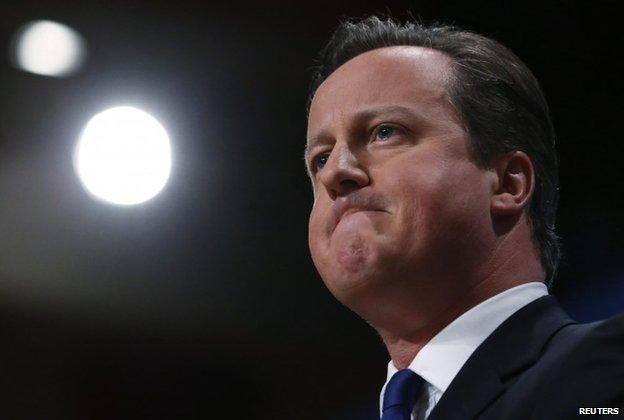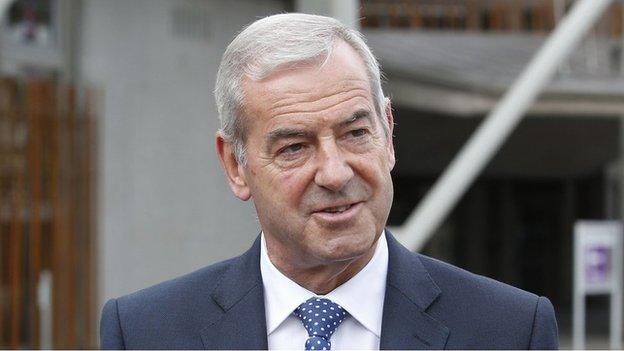Let's play a fun game of 'Duopoly'
- Published

David Cameron is promising that, if re-elected, he would raise the tax-free allowance
Here is a fun game you can all play. Take David Cameron's speech today - and project its key offer forward to a time in which income tax has been devolved to Scotland.
Key offer? Protect NHS spending in England? Close. Constrain immigration? No, not that one either. Income tax cuts? Got it.
Mr Cameron is promising that, if re-elected, he would raise the tax-free allowance from £10,5000 to £12,500. And he would increase the threshold at which an individual pays the 40p rate from £41,900 to £50,000.
Both these promises to be delivered by the end of a five year UK government term. Which makes them, sceptics might say, rather dependent upon closing the deficit by 2018 as scheduled.
The sceptical chorus might be swelled still further by those noting that this largesse is accompanied by projected cuts in benefits in order to achieve that deficit target.
Let us sideline these two debates for a moment.
Headline offers
Let us focus for now on the headline offers - and let us play the game of imagining what might happen if tax is devolved, if there is not one taxation budget each year but two. One at Westminster, one at Holyrood.
You might call the game Duopoly.
The Tory offer on devolved tax, as set out in the Strathclyde Commission, external, was for all income tax bands and rates to fall within the control of the Scottish Parliament.
With one exception. The tax-free allowance - the figure determining the point at which one starts paying tax - would be reserved to Westminster.
So, in our game, David Cameron's first promise would apply to Scotland - under the Tory plans.
That promise would, in effect, exempt those on the minimum wage from paying tax.
But promise number two - affecting the better paid - would not automatically apply to Scotland, again under Tory thinking.
It would be up to Scotland to determine the upper band rules. Would Scotland vote to match the Cameron plan - or take a different tack?

The Scottish Parliament's financial powers are expected to increase
I am aware, of course, that this is getting decidedly far ahead of the pack.
Mr Cameron's return to power - which, he hopes, would be unsullied by the necessity of coalition - is dependent upon the small matter of support from the people of the UK.
Plus the rules affecting future devolution of tax are dependent upon discussion, negotiation and agreement - involving political parties and the wider populace.
This exercise, headed by Lord Smith of Kelvin, is being taken seriously on all sides.
It is particularly pertinent to note that he has civil servants in his secretariat from the Scottish Parliament, the Scottish government and the UK government.
The UK advisers include officials from the Treasury and the Cabinet Office.
But already there is evidence of disquiet, notably over income tax. Political parties, naturally, are considering their own interests alongside those of the people of Scotland and the wider UK.
Tax basket
To be clear, the debate is not confined to income tax. The Liberal Democrats, for example, want to devolve a wider basket of taxes.
The SNP starting position remains: transfer the lot.
But consider also the two biggest UK parties. For, if this is to be implemented, it will be a Westminster statute with Holyrood agreement.
The Tories, as billed, say: devolve income tax virtually in its entirety.
That, they say, is a neat, sensible way to give Holyrood responsibility for a proportion of taxation as well as devolved expenditure.
Their political advantage? Firstly, it allows them to project themselves as the party of reformed devolution.
Secondly, it enables them to tell the people of England that Scotland is now responsible for raising its own cash - or at least a fair chunk of it.
That Scotland is less "dependent" on Westminster as a consequence. I stress, this would be the political message - as distinct from actual arithmetical considerations.

Lord Smith is heading the devolution commission on more powers
Thirdly, the Tories would be able to reinforce their message that England must not be forgotten in an era of enhanced devolution. They would demand English votes on English laws.
This latter demand is designed to appeal to English sentiment, to sideline UKIP and to discomfit the Labour Party. For a Tory leader, what's not to like?
So a message which is aimed at Scotland - devolved income tax - contains political strategies primarily targeted upon England.
And Labour? They say that there should be more income tax power at Holyrood than currently envisaged. But not full control.
Remember how tax devolution would work. Scotland is currently funded almost entirely by block grant - other than business rates and council tax.
Under the Calman plan, external, due to be implemented from April 2016, Scotland will be responsible for 10p worth of income tax at all rates.
The block grant, varied annually by Barnett, will be reduced to match the sums raised by Scottish tax plans.
Eyebrows raised
If the Scottish tax take is buoyant, then Scotland thrives and has more for public spending.
If the Scottish tax take slumps, then Scotland has less cash. The block grant is calculated according to the tax take in the remainder of the UK, rUK.
Labour says that means if the Scottish tax percentage is too high, then there is a considerable risk that Scottish public spending would suffer.
And their second concern concerns England.
If Scotland has virtually full control of Scottish income tax, would there not be eyebrows raised when MPs from Scotland participate in Commons votes over income tax for England?
There would indeed. English laws, says David Cameron, require English votes.
Which works for the Tories with but one MP from Scotland, presently. But which poses a few problems for Labour which currently relies upon Scotland to provide 41 MPs.
This debate has some way to go.